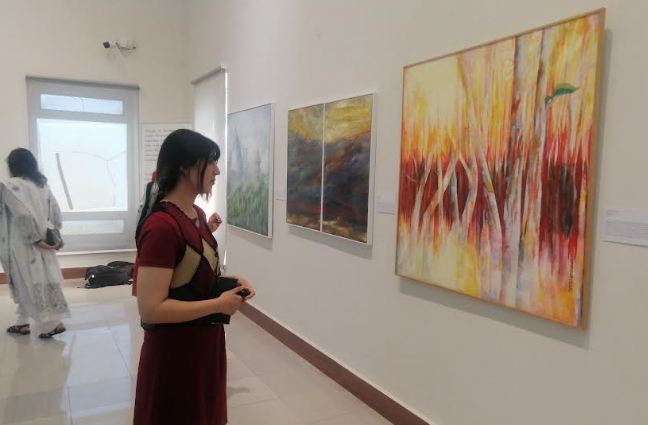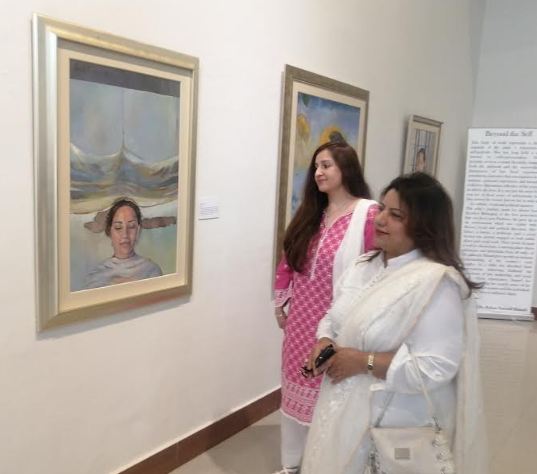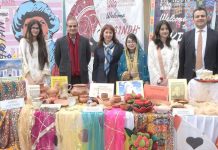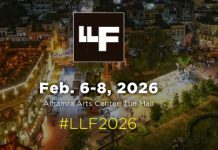ISLAMABAD, APR 28 /DNA/ – In a rare confluence of artistic brilliance, three of Pakistan’s most celebrated creative minds — Jimmy Engineer, Rahat Naveed Masud, and Amna Patudi — come together to present “A Moment in Time”. This extraordinary exhibition kicked off at the National Art Gallery, organized by For Art Sake and Pakistan National Council of the Arts (PNCA) on Monday, and will remain open till May 12, between 10 am to 4pm on working days.

The exhibition is not just a showcase of individual mastery, but a symphonic blend of vision, spirit, and storytelling. Each canvas breathes life into forgotten memories, quiet reflections, and the timeless dance of culture and identity. As their distinct styles intertwine, the trio invites art lovers to pause, to wonder, and to lose themselves in the powerful beauty of a single, unforgettable moment captured through their art.

Embarking on his professional journey in 1976, Jimmy has created over 2,000 paintings, 1,000 calligraphies, and numerous prints that are part of private collections worldwide, including in China, India, Russia, the UK, and the US. His artwork spans various genres, encompassing historical events, religious themes, landscapes, and abstract compositions. Notably, his series on the Partition of India and depictions of Allama Iqbal’s “Javed Nama” are acclaimed for their emotional depth and intricate detail. In recognition of his contributions, Engineer has received numerous awards, including the Sitara-e-Imtiaz (Star of Excellence) and Hilal-e-Imtiaz (Crescent of Excellence) from the Government of Pakistan in 2005 and 2025 respectively.
Jimmy Engineer’s paintings stand out for their emotional intensity, detailed execution, and thematic boldness. His most celebrated works — particularly those depicting the Partition of India and philosophical interpretations of Allama Iqbal’s Javid Nama — demonstrate a deep commitment to capturing historical and spiritual narratives. His compositions often blend realism with symbolic elements, creating visually powerful, almost cinematic scenes that evoke strong emotional responses.
Critically, while his technique shows classical influences with meticulous draftsmanship, some art critics argue that his work tends toward the overtly didactic. His paintings often prioritize message over subtlety, sometimes bordering on melodrama. The scale and ambition of his historical canvases are impressive, but they can occasionally feel overwhelming or overly sentimental. Moreover, Engineer’s style does not align with modernist or contemporary art trends; instead, he remains firmly rooted in narrative realism, which gives his paintings wide public appeal but limits his critical acclaim among avant-garde art circles.
Professor Dr Rahat Naveed Masud is one of the pioneering artists to have completed a PhD in Fine Arts (Art Practice) from London UK. She has been the principal of the College of Art & Design, University of the Punjab, Lahore and also Dean, Faculty of Art and Humanities. She has won several national awards in recognition of her work including the Presidential award ‘Pride of Performance’, the ‘International Artist for Peace’, Award, Shanghai, China; the Punjab Council of the Arts prize; the Artists’ Association of Punjab Award; the Fatima Jinnah Award for ‘meritorious performance in Painting’. Her work has been widely exhibited, representing Pakistan in exhibitions held in China, Iran, India, Korea, Oman, Abu Dhabi, Sharjah, Malaysia, Tanzania, Siri Lanka, USA and the UK. She is co-author of a seminal research on the history of Punjab University’s Art College, entitled “A journey of Resilience and Success (1940-2013)”.
‘Beyond the Self’ is the theme of her paintings put on display in exhibition. This body of work represents a distinct segment of the artist ‘s repertoire—her self-portraits. She has long held a deep interest in self-representation. These portraits serve as a visual chronicle, mapping both the personal and the socio-cultural dimensions of her lived experience, articulating a narrative that encompasses both intimate, personal experiences and broader, collective dimensions reflective of the society in which she lives. It is not just the artist that you see in these series of self-portraits but they mirror the society that we live in with all its cultural, social and political nuances. Rahat Masud’s journey spans for almost four decades, belonging to the first generation that was born post-partition of the subcontinent. These experiences shaped her worldview, making her acutely aware of the forces that shape societies and the individuals who strive to influence them. Her paintings are a testimony to a life lived though all these engaging times.
Amna Ismail Pataudi is a distinguished Pakistani artist, curator, art critic, and educationalist whose multifaceted contributions have significantly enriched the nation’s art landscape. Pataudi’s paintings are renowned for their meticulous technique and profound thematic depth. She often emphasizes the significance of still-life painting, considering it foundational to various art genres. Her works frequently explore themes of heritage, identity, and spirituality, employing both traditional and contemporary techniques. Notably, her book 47 Paintings showcases artistic interpretations of world musical instruments using miniature art techniques and mixed media, reflecting her innovative approach to visual storytelling.
Beyond her personal artistry, Pataudi has curated numerous exhibitions that highlight diverse artistic expressions. She co-curated “A Moment in Time” at the Pakistan National Council of the Arts (PNCA) in Islamabad, featuring a range of artists and emphasizing the importance of still-life painting in contemporary art. Additionally, she collaborated on the exhibition “Mirror to the Soul,” showcasing Chinese artist Professor Zhao Yingming’s portraits, fostering cross-cultural artistic exchange.
Pataudi’s commitment to art extends internationally. She co-curated the exhibition “Humanism: Flowering of the Being” at Asia House Gallery in London, featuring works by Pakistani and British-Pakistani artists, with proceeds supporting various charities. Moreover, she co-curated “Challenging Oeuvres” at the Alhamra Arts Centre in Lahore, presenting works by differently-abled artists from the Differently Abled Artists Consortium (DAAC), highlighting inclusivity in the arts.

















